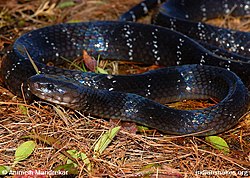Biology:Bungarus bungaroides
From HandWiki
Short description: Species of snake
| Bungarus bungaroides | |
|---|---|

| |
| Scientific classification | |
| Domain: | Eukaryota |
| Kingdom: | Animalia |
| Phylum: | Chordata |
| Class: | Reptilia |
| Order: | Squamata |
| Suborder: | Serpentes |
| Family: | Elapidae |
| Genus: | Bungarus |
| Species: | B. bungaroides
|
| Binomial name | |
| Bungarus bungaroides (Cantor, 1839)
| |
| Synonyms | |
| |
Bungarus bungaroides, the northeastern hill krait, is a venomous species of elapid snake.[2]
Description
This is a moderate- to large sized krait. Diagnostic characters:
- Dorsal scales in 15 longitudinal rows at midbody. Mid-dorsal scales are slightly enlarged anteriorly, but distinctly enlarged posteriorly.
- Subcaudal scutes ordinarily divided anteriorly, but occasionally some scutes may be single, but always divided near the tip
- Ventrals 220–237; subcaudals 44-51
- Dorsum – smooth, black with a series of very narrow white to pale yellowish lines or crossbars; on the belly, the light crossbars widen to form distinct transverse bars
- head slightly distinct from the neck. Top of the head is flat. Snout is blunt.
- Total length of largest male 1400 mm (55 in); tail length 160 mm (6.3 in)
Distribution and habitat
This species is found in Myanmar, India (Assam, Cachar, Sikkim), Nepal, and Vietnam at elevations around 2040 m as well as in Tibet. The type locality is given as: "Cherra Punjee, Khasi Hills, Meghalaya, India".[3][4]
References
- ↑ Wangyal, J.T.; Das, A.; Ghosh, A.; Limbu, K.P. (2022). "Bungarus bungaroides". IUCN Red List of Threatened Species 2022: e.T192121A219114268. doi:10.2305/IUCN.UK.2022-2.RLTS.T192121A219114268.en. https://www.iucnredlist.org/species/192121/219114268. Retrieved 15 August 2023.
- ↑ Bücherl, W.; Buckley, E.E.; Deulofeu, V. (2013). Venomous Animals and Their Venoms: Venomous Vertebrates. Elsevier Science. p. 531. ISBN 978-1-4832-6363-2. https://books.google.com/books?id=dCzLBAAAQBAJ&pg=PA531. Retrieved 9 June 2019.
- ↑ Boulenger, G.A. 1896. Catalogue of the Snakes in the British Museum (Natural History), Volume III. London. p. 371.
- ↑ Bungarus bungaroides at the Reptarium.cz Reptile Database. Accessed 18 November 2013.
- Boulenger, G. A. 1890. The Fauna of British India, Including Ceylon and Burma. Reptilia and Batrachia. Taylor & Francis. London. xviii, 541 pp.
- Cantor, T.E. 1839. Spicilegium serpentium indicorum [parts 1 and 2]. Proc. Zool. Soc. London 7:31-34,49-55.
- Golay, P. 1985. Checklist and keys to the terrestrial proteroglyphs of the world (Serpentes: Elapidae – Hydrophiidae). Elapsoidea, Geneva.
- Slowinski, J. B. 1994. A phylogenetic analysis of Bungarus (Elapidae) based on morphological characters. Journal of Herpetology 28(4):440-446.
Wikidata ☰ Q2928188 entry
 |


